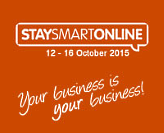Stay smart online
As individuals, we share a lot of sensitive data and information online, sometimes without thinking. It could be on a social media website, on an online shopping website or even sending emails to our family and friends. This information is not only valuable to you but it is something that cyber criminals would love to access as well.
Security awareness week 2015
 National Stay Smart Online security
awareness week kicks off on Monday 12 October. The campaign is run annually by the Australian
Government's Department of Communications and the Arts, and the University is
once again proud to be a Stay Smart Online Partner.
National Stay Smart Online security
awareness week kicks off on Monday 12 October. The campaign is run annually by the Australian
Government's Department of Communications and the Arts, and the University is
once again proud to be a Stay Smart Online Partner.
The theme for this year's event is 'Your Business is your business', with a focus not just on University business, but also your own personal digital footprint. The campaign aims to promote resources that you need to stay safe online.
Complete the University's Information Security Awareness Training module (see below) by the end of the Stay Smart Online week (18th October 2015) and be in the running for a $50 gift card.
What Can I Do to Protect Myself?
Keeping information private and secure means we should focus on five areas of security:
- Passwords – Passwords and PINs are used to identify you. Sometimes they are the only defence to protect your information against unauthorised access. Use a strong and unique password for all websites and devices you use; and don't forget to change it periodically.
- Back-up – Data or access to data stored on a personal computer, phone or tablet can be lost, often without any warning. Hardware failure, theft, a virus or malware infection can make recovering your data expensive or impossible. You need to back-up your data. Regularly back-up your data to a removable storage device such as a hard drive, or a cloud back up service. University data should always be stored on a share drive or in HP Records Manager (TRIM).
- Awareness – The more you are informed about online security, the easier it is to incorporate security practices into your everyday life. Sign up to the Stay Smart Online Alert Service to receive information about the latest threats and vulnerabilities and how to address them.
- Privacy – Treat your personal information as you would treat your money—don't leave it lying around for others to take. With your stolen identity, a person may access your bank account, obtain credit cards or loans in your name, or claim welfare benefits, and potentially ruin your credit rating.
- Mobile devices – are vulnerable to loss or theft. Just like your computer at home they can be hacked, infected with a virus and, if unsecured, provide access to your personal information. Treat your smartphone like your wallet; keep it safe and with you at all times. Also, be careful using untrusted Wi-Fi networks.
Resources available
- Make sure you have anti-virus installed on all your devices. The University provides free Sophos anti-virus for home use.
- Complete the University's Information Security Awareness Training module. The module includes a quick test at the end. To access the training go to http://elearn.com.au/newcastle/ and use the following login details: Username: newcastle Password: elmo
- Subscribe to one (or all) of these Stay Smart
Online resources to receive timely and relevant information security alerts:
- Facebook page - https://www.facebook.com/staysmartonline
- Twitter Feed - https://twitter.com/CommsAu
- YouTube channel - http://www.youtube.com/user/staysmartonline
Related news
- Shanae’s passion for caring delivers her dream to work in health
- Food and nutrition degree serves Keren a rewarding career
- Kicking goals on and off the field, Joeli proves you can do it all
- Proving age is just a number, Arlyn wants to inspire more women in their 50s to pursue education
- Sky’s the limit for graduates on the Central Coast
The University of Newcastle acknowledges the traditional custodians of the lands within our footprint areas: Awabakal, Darkinjung, Biripai, Worimi, Wonnarua, and Eora Nations. We also pay respect to the wisdom of our Elders past and present.